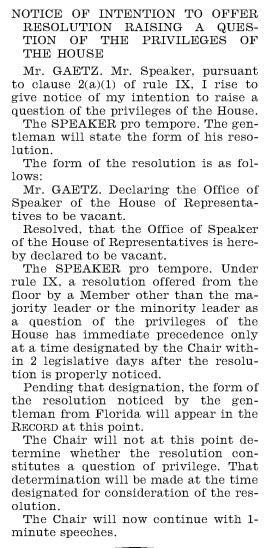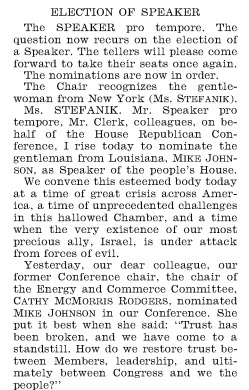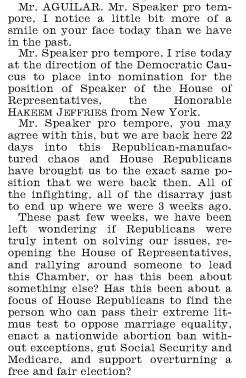On October 25, Representative Mike Johnson was elected the new Speaker of the House after Kevin McCarthy was removed from the position—marking the first time that a Speaker has been voted out in U.S. history. However, the journey to replace the Speaker was arduous and emphasizes the various schisms that currently exist within the House of Representatives, and even within the Republican party itself. But what does the Speaker of the House do, how are they elected, and why did it take three weeks to replace McCarthy? Let’s use HeinOnline, particularly our U.S. Congressional Documents database and the Congressional Record Daily within it, to explore these questions.


Removal from Office
The previous Speaker of the House, California Representative Kevin McCarthy, was voted out of his position in a 216-201 vote on October 3[1]169 Cong. Rec. H4953 (2023). This document can be found in HeinOnline’s U.S. Congressional Documents database. in a procedure called motion to vacate. McCarthy frustrated several Republican House members when he negotiated with Democrats to pass a short-term spending bill that would temporarily avoid an impending government shutdown. On October 2, one of these members, Republican Representative Matt Gaetz, forced a vote on a motion to vacate McCarthy’s position.[2]169 Cong. Rec. H4935 (2023). This document can be found in HeinOnline’s U.S. Congressional Documents database. Eight Republicans joined all Democrats in voting for the ouster, marking the first time that a sitting Speaker has been voted out of position. In the past, Speakers have only been replaced mid-term due to death or resignation. McCarthy decided that he would not run for re-election.


Without a Speaker, the House was unable to pass any legislation. In the meantime, Representative Patrick McHenry of North Carolina was designated Speaker pro tempore, which means that he was allowed to bring chamber to order, but couldn’t do much else.
Nominees and Failed Votes
In a closed-doors election among the Republicans, Steve Scalise of Louisiana, the House Majority Leader, was nominated to run for Speaker. Meanwhile, Democrats nominated their House Minority Leader, Hakeem Jeffries of New York. Because there were 433 House members present for the vote (there are currently two vacancies), a nominee needed at least 217 votes to win the position. With all Democrats voting for Jeffries, in the House with a narrow 221-212 majority, the Republican nominee could only afford to lose five Republican votes from their party. However, Scalise wasn’t able to secure the 217 votes, so he withdrew his name.
The next Republican nominee, Jim Jordan of Ohio, a Trump ally and founder of the Freedom Caucus, also wasn’t able to secure 217 votes.[3]169 Cong. Rec. H5035 (2023). This document can be found in HeinOnline’s U.S. Congressional Documents database. With frustrations rising, another government shutdown on the horizon (the current temporary spending bill can only keep the government afloat until November 17), and Biden looking to pass a bill that would send aid to Ukraine and Israel, there was debate about whether McHenry, the pro tempore Speaker, should be given the authority to pass legislation. Another representative, Tom Emmer, the GOP Whip, was also nominated, but he quickly withdrew his name, unwilling to become the third candidate to fail to secure the needed 217 votes.
A Lesser-Known Name to the Spotlight
When Mike Johnson was voted in as Speaker, many people asked the question, “Who is that?” Johnson is not a leading name in politics—but this is perhaps what helped him secure his victory. Mike Johnson is a Louisiana Republican who was nominated on October 25[4]169 Cong. Rec. H5047 (2023). This document can be found in HeinOnline’s U.S. Congressional Documents database. hours after Emmer withdrew his bid for the position. Johnson is the GOP vice chair, and he even garnered the support of former President Trump, who posted on his Truth Social platform that he strongly suggested Republicans vote for him. Johson was elected to Congress in 2016 and has few political enemies compared to some of the former Speaker nominees—although he did play a large role in disputing Trump’s 2020 election loss. He won the Speakership against Jeffries in a vote 220-209.[5]169 Cong. Rec. H5047 (2023). This document can be found in HeinOnline’s U.S. Congressional Documents database.
In the first vote under Johnson’s Speakership, the House voted to support Israel in its war against Hamas.[6]169 Cong. Rec. H5047 (2023). This document can be found in HeinOnline’s U.S. Congressional Documents database.


Historical Precedents
It isn’t common for the House to be in turmoil over selecting a Speaker, but it has happened before—including earlier this year, when it took Kevin McCarthy 15 rounds of voting to secure the Speakership.[7]169 Cong. Rec. H5047 (2023). This document can be found in HeinOnline’s U.S. Congressional Documents database. However, the record for the most rounds of voting for a Speaker belongs to Republican Nathaniel Prentice Banks of Massachusetts, as it took 133 rounds of voting held over the course of two months for him to be selected as Speaker, largely due to divisions over issues of slavery and immigration. That was in 1856, during the 34th Congress, when 20 different people had attempted to become Speaker. In fact, most instances where it took multiple rounds of voting to select a Speaker happened before the Civil War. However, before this year, the next most recent instance was in December 1923, when it took the 68th Congress nine rounds of voting over three days to elect Republican Fredrick Huntington Gillett.
Although it has never been used until now, the “motion to vacate” concept dates back to Thomas Jefferson’s A Manual of Parliamentary Practice for the Use of the Senate of the United States.[8]Thomas Jefferson. Manual of Parliamentary Practice: For the Use of the Senate of the United States (2). This title can be found in HeinOnline’s U.S. Congressional Documents database. Per the United States Constitution, Article 1, Section 2, the House itself chooses its Speaker and other officers.[9]2022 Edition Annotating Interpretations to Various Articles of the Constitution 208 (2023) Section 2: House of Representatives. This document can be found in HeinOnline’s World Constitutions Illustrated database. However, the Speaker doesn’t actually need to be a member of the House of Representatives—hence why some Republicans wanted Trump to be nominated for the position. However, as of yet, there has never been a Speaker who was not a member of the House.
Speaker of the House? More Like Reader of the Blog
In the HeinOnline Blog, we are always covering current events, happenings in government, interesting stories from history, true crime and gruesome trials, and much more. Don’t miss anything—be sure to subscribe to the Blog so you get each new post delivered straight to your inbox!
HeinOnline Sources[+]
| ↑1 | 169 Cong. Rec. H4953 (2023). This document can be found in HeinOnline’s U.S. Congressional Documents database. |
|---|---|
| ↑2 | 169 Cong. Rec. H4935 (2023). This document can be found in HeinOnline’s U.S. Congressional Documents database. |
| ↑3 | 169 Cong. Rec. H5035 (2023). This document can be found in HeinOnline’s U.S. Congressional Documents database. |
| ↑4, ↑5, ↑6, ↑7 | 169 Cong. Rec. H5047 (2023). This document can be found in HeinOnline’s U.S. Congressional Documents database. |
| ↑8 | Thomas Jefferson. Manual of Parliamentary Practice: For the Use of the Senate of the United States (2). This title can be found in HeinOnline’s U.S. Congressional Documents database. |
| ↑9 | 2022 Edition Annotating Interpretations to Various Articles of the Constitution 208 (2023) Section 2: House of Representatives. This document can be found in HeinOnline’s World Constitutions Illustrated database. |



